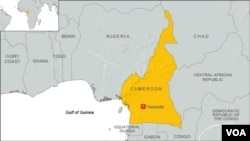There has been mixed reaction in Cameroon following a Transparency International report that placed the central African state as one of the most corrupt African nations along side South Africa, Ghana, Nigeria and Liberia.
Twenty-two-year-old university student Celine Ateba struggles at the Yaounde train station to secure a ticket to travel to the northern part of Cameroon. She says after she was informed all available seats had been taken, a worker at the railway company approached her and asked for a bribe to sell her a ticket.
Corruption, a cancer
She says corruption is a cancer that is eating Cameroon. She says in hospitals, train and police stations, public offices and schools, corruption is practiced openly and some people are no longer ashamed of it. She says it is unfortunate that her country is one of the most corrupt nations in the world.
In a new report, the non-governmental organization Transparency International found that Cameroon was among the most corrupt states in sub-Saharan Africa.
The survey included 43,000 respondents from 28 countries who were interviewed between March and September 2015.
Issa Tchiroma Bakary, a Cameroon government spokeperson, describes the report as biased and says Transparency International is trying to soil Cameroon's image.
He says the group's report has no viable data, but only opinions collected from a thousand people without any precise criteria. He says it provides no statistics on material acts of corruption and accuses Transparency International of undermining efforts to economically develop Cameroon.
Growing awareness
But Dieudonne Massi Gams, chairperson of Cameroon's national anti-corruption commission, CONAC, says corruption remains a serious problem in the country. He says he is happy there is growing awareness as many more Cameroonians have been lodging complaints at his commission.
He says people should acknowledge that complaints of corrupt practices have increased from barely 200 per year five years ago, to 3,000 in 2015. He says he has observed an increasing willingness of Cameroonians to report corrupt government officials.
In its report, Transparency International says corruption creates and increases poverty and exclusion. It says whisteblowing is key to fighting graft, but that many people are afraid to come forward as they feel it is too dangerous or ineffective.




